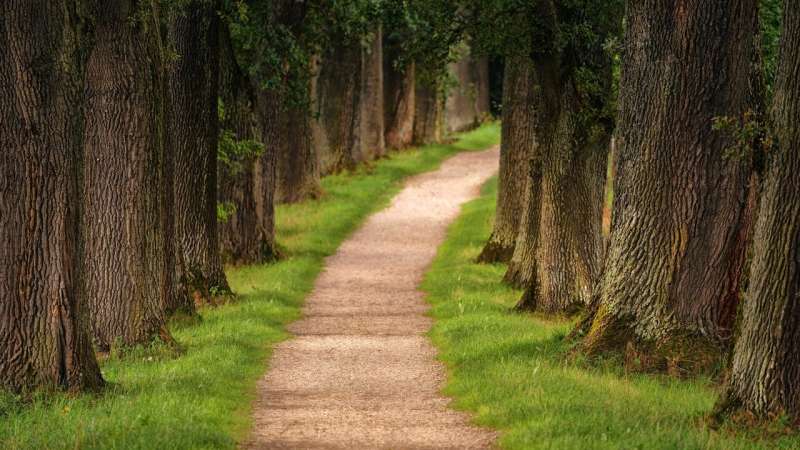This article has been reviewed according to Science X's editorial process and policies. Editors have highlighted the following attributes while ensuring the content's credibility:
fact-checked
trusted source
written by researcher(s)
proofread
How a downtown university 'story walk' promotes children's literacy and belonging in higher education

Feeling a sense of uncertainty about belonging is most pronounced for students during times of transition, like when they enter university. This can be all the harder for students who are the first generation in their families to attend university—and students who face socio-economic barriers to post-secondary education.
When a student's sense of belonging improves, they not only become more academically competent but also experience protective benefits for their mental health. More critically, a sense of belonging might have a long-lasting effect on post-secondary students' persistence and engagement in their studies.
As such, it is important that post-secondary institutions undertake concerted, sustained and targeted efforts to create a sense of belonging. One way that institutions can achieve this is to make campuses more welcoming for children within communities, a place that is familiar. This approach may encourage children to envision university as a place where they belong—and a future path for them.
At MacEwan University in Edmonton, we established a StoryWalk for children and families where they follow pages of a storybook posted sequentially along a path on campus. The activity is designed to invite families for a fun and cost-free extra-curricular activity to plant the seeds of belonging on a campus from a young age while supporting children's early literacy.
University's community engagement
StoryWalk was developed in 2007 in Vermont in the United States, in partnership with the Kellogg-Hubbard Library. Similar activities are now taking place around the world. Bringing StoryWalk to a downtown university campus allows the university to engage students, families and children in an innovative way.
Books on the StoryWalk at MacEwan focus mainly on community building and being stronger together. Initial books—including Walking Together by Elder Albert D. Marshall and Louise Zimanyi and Be a Good Ancestor by Leona Prince and Gabrielle Prince—highlight Indigenous ways of knowing and building a community.
We have also programmed Every Child a Song: A Celebration of Children's Rights by Nicola Davies. Our intention is to rotate book selections while striving to reflect aspects of social, cultural and economic diversity relevant to Edmonton in book choices.
StoryWalk at MacEwan collaborates with organizations and schools that intentionally support families to build their capacity to be successful parents raising healthy children. The project has partnered with local not-for-profit organizations like Terra Center and Bent Arrow Traditional Healing Society that empowers families and young children. We plan to expand our circle of collaborators gradually.
While at the university, families can also participate in other free activities. StoryWalk at MacEwan collaborated with Heather Fitzsimmons Frey, who researches the arts and cultural sector and young people, and her work with Elm Tree Theater. As part of this collaboration, we offered a free 60-minute theater experience for children and families.
Families are also invited for ongoing supplementary activities in the kihêw waciston Indigenous Center.
Importance of early learning
Following a StoryWalk pathway with adults allows children to learn new words, describe things and events and tell stories as they walk together.
The physical movement while engaging with a story helps children understand story sequences—how stories have distinct narrative components. Hearing and playing with sounds and letters can enhance children's abilities to notice and work with the specific sounds (phonemes) in spoken words. In addition, strengthening children's self-regulation and attention can positively impact academic outcomes.
The accompanying activities, including reading aloud, are a playful means for children to develop positive attitudes towards reading, and develop early literacy skills. These include building their vocabulary and gaining expressive language.
Family engagement is another critical component of the StoryWalk. Doing things together as a family builds values, traditions and rituals that keep children connected to important people and places in their lives.
These are some of the ways the walk provides an opportunity for parents, educators and other significant adults to be with children, reinforcing the importance of a person's positive connections as they navigate an educational journey.
Extending a welcome
Yet, inviting early and elementary learners for a few visits to a post-secondary institution is not enough in itself for concretely fostering belonging for any students, particularly for first-generation or marginalized students.
Formal and informal mentorship opportunities between current and prospective students can also help extend the welcoming environment beyond initial interactions, offering sustained support and guidance.
We hope StoryWalk at MacEwan can be one meaningful way to enhance the educational landscape for young children—while also fostering a sense of belonging and possibility within higher education.
Provided by The Conversation
This article is republished from The Conversation under a Creative Commons license. Read the original article.![]()





















